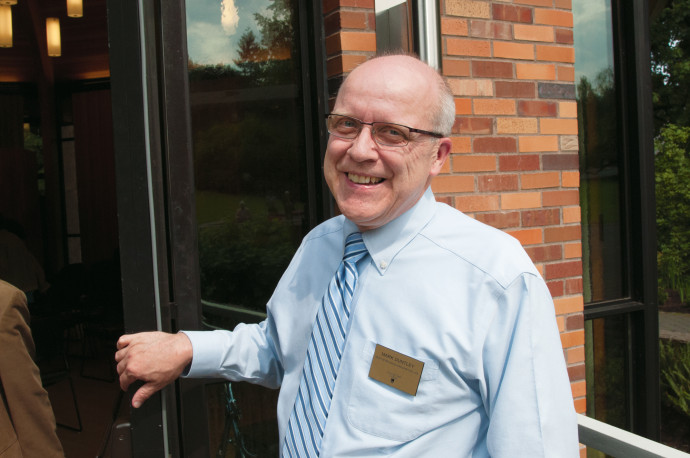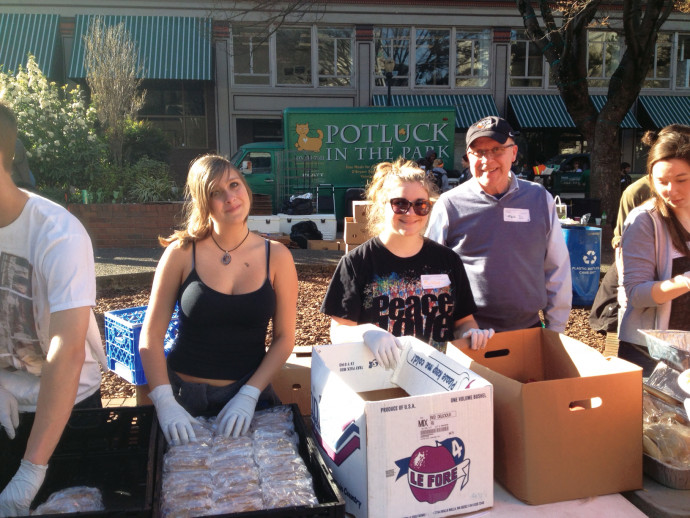Q&A With Rev. Duntley Religious and Spiritual Renewal

Rev. Mark Duntley, dean of religious and spiritual life, has served the Lewis & Clark community since 1989. His office supports all religious life programs that take place on campus and has its roots in the Presbyterian heritage of the college. Over the last three years, Duntley has spearheaded the college’s Spiritual Initiatives Project. The Chronicle caught up with Duntley to learn more about this effort.
What are the origins of the Spiritual Initiatives Project?
In the spring of 2012, we had an opportunity to reconsider our programming and staffing and think more about what would enrich and enhance our students’ spiritual growth. We know that a majority of our students don’t claim to have a personal religious affiliation. But that doesn’t mean they’re not spiritual—it just means they’re not connected with a particular religion. So I thought it would be a good idea to figure out some innovative ways of enhancing spirituality and spiritual life in a broader sense, while still continuing to support traditional religious expression among our students.
Why is religious and spiritual life important on campus?
I believe the heart, the mind, and the soul should be integrated. A liberal arts college like Lewis & Clark goes beyond just focusing on the intellect. At its best, the college experience helps us become fully engaged human beings. Lewis & Clark ranks higher than most of its peer institutions on a category researchers call “spiritual quest,” which means that many of our students are really thinking and seeking and trying to grow spiritually. That’s at the heart of the Spiritual Initiatives Project—to provide opportunities for that questing, for that searching, for that questioning.
What are the project’s main focus areas?
The Spiritual Initiatives Project focuses on three main areas: interfaith programs, spiritual contemplation programs, and faith in action programs.
What are some examples of interfaith programs?
We’ve taken students on interfaith field trips called “Souljourns” to places like Our Lady of Guadalupe Trappist Abbey, the Bilal Mosque, St. John the Baptist Greek Orthodox Church, and a Sicangu Lakota Sweat Lodge. As you branch out, you realize there are all kinds of connections and interconnections.
How does meditation fit it?
A lot of people like to meditate. But, as a spiritual practice, it’s like any other discipline or skill: You need to have an opportunity to learn how to do it and have a regular forum or place to do it. Along with special meditation retreats, we’ve offered twice-weekly meditation opportunities. This semester, we have a biweekly series called “Who Meditates?” Different faculty and staff are leading different styles of meditation. There’s even a hope that we can get a class going that teaches meditation as a tool for stress reduction.
Why the emphasis on faith in action?
A lot of our students do community service, but they don’t have the chance to really reflect on it. Why do we care about other people? Many times, we do so because we know it’s right, but we don’t consider why we think it’s right. We’re just suggesting that one of the ways to explore your own spiritual identity and to grow spiritually is to engage with other human beings in opportunities to help and to be of service, and then to reflect together about those experiences.
How are students reaching out to the Portland community?
One issue we’re focusing on is hunger. It’s an incredibly important moral issue that we often overlook. We’ve organized student volunteer opportunities with Clay Street Table and Potluck in the Park, both of which serve food to the homeless in downtown Portland. We also sponsored a “Feed the Children” letter writing campaign. All of these efforts engage students with the harsh reality of hunger in the midst of our culture of abundance.

Who are some of your collaborators and partners?
There’s a wonderful Greater Portland Hillel that works with our office and serves our Jewish students. We’ve also partnered with Our Lady of the Lake Catholic Parish, the Archdiocese of Portland, and the InterVarsity Christian Fellowship to help serve our Christian students. One of our newest partnerships is based right here on campus: We’ve partnered with Campus Living in Stewart Hall, which is home to the Holistic Wellness Living-Learning Community, to uplift spiritual wellness as a part of holistic wellness. It’s really exciting to be able to say that we’re not just here in the chapel, but we’re out in the residence halls… and we’re out in greater Portland.
—Compiled by Rebecca Lill CAS ’15
More L&C Magazine Stories
Lewis & Clark Magazine is located in McAfee on the Undergraduate Campus.
MSC: 19
email magazine@lclark.edu
voice 503-768-7970
fax 503-768-7969
The L&C Magazine staff welcomes letters and emails from readers about topics covered in the magazine. Correspondence must include your name and location and may be edited.
Lewis & Clark Magazine
Lewis & Clark
615 S. Palatine Hill Road MSC 19
Portland OR 97219

